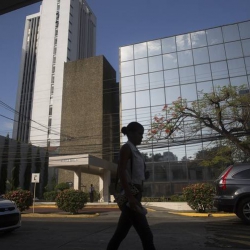
David Baazov was mentioned in the Panama Papers. Mossack Fonseca maintains it has done nothing illegal.
Amaya Gaming announced it had received a renewal of approval for its PokerStars and FullTilt Poker brands, despite an ongoing investigation into insider trading charges by a Canadian regulator. The Division of Gaming Enforcement continued the license for PokerStars and FullTilt to operate legally within the state of New Jersey.
Amaya Gaming launched PokerStars and Resorts Casino website on March 21. In the first week of operation, the poker site was the number one brand in New Jersey, despite competitors having a two-year headstart on signing up players.
Amaya Pleased with PokerStars Launch
Rafi Ashkenazi, the Interim CEO of Amaya Inc., said his company is pleased with the initial launch of PokerStars. Ashkenazi said the company is also pleased with the working relationship it has developed with the DGE in their six months of cooperation.
Despite the good news, Amaya Gaming is in the midst of a major crisis in the Canadian market. The Quebec-based trading regulator, AMF, indicted Amaya’s CEO and founder, David Baazov, of five charges stemming from insider trading allegations. 23 charged were filed against Amaya executives by AMF.
In response to the indictments, David Baazov stepped down as the CEO of Amaya Inc. Rafi Ashkenazi said at the time that the board of directors gave their full support to the founder of the company. Baazov said he looked forward to proving the charges of misconduct to be wrong.
Josh Baazov’s Insider Trading Problems
Josh Baazov, the older brother of David Baazov, was one of 13 people who had their trading privileges on the Toronto Stock Exchange suspended by the AMF. Documents show the AMF accusing Josh Baazov of insider trading on 7 different gaming companies — including several bought by Amaya — from 2011 to 2016.
Amaya Gaming has said Josh Baazov is not, nor ever has been, affiliated with the company. Older press releases suggest another story, according to Toronto-based publication, Globe & Mail.
The Panama Papers
Globe & Mail also reported on the revelation that David Baazov might have had shell corporations formed by Mossack Fonseca, the Panamanian law firm at the center of the Panama Papers scandal.
It was revealed this week by the International Consortium of Investigative Journalists that Mossack Fonseca has started thousands upon thousands of shell corporations for the global economic and political elite. Many of these shell operations are legal, but that does not keep them from hiding trillions of dollars of wealth in offshore tax shelters.
Mossack Fonseca’s Shell Corporations
In 11 million leaked documents, a dozen current or former world leaders have been tied to shell corporations created by Mossack Fonseca. That list includes the Vladimir Putin (through his best friend), President Xi Jinping of China (through family members), the best friend of Bashar Assad of Syria, and the wife of the prime minister of Iceland. The Icelandic PM resigned from office amidst protests.
David Baazov was linked to the Zhapa Holdings, a shell corporation formed by Mossack Fonseca. Zhapa Holdings is tied to a Montreal-based company, IMF Holdings, which has ties to Amaya Gaming. With one scandal already in progress, a second scandal involving financial issues could be a major blow for David Baazov.
Teddy Sagi’s Shell Corporations
David Baazov is not the only gaming executive mentioned in the Panama Papers. Playtech founder and former CEO, Teddy Sagi, also was listed as a client of Mossack Fonseca. It appears that Mr. Sagi, who is worth $3.4 billion, had 16 different shell corporations through the firm.
Teddy Sagi’s case appears to be similar to other business leaders who used Mossack Fonseca. In country’s where the system of taxation is high, people hide wealth in offshore corporations which might or might not have operations. This is legal in many cases, but considered unethical in many lands. (President Barack Obama called such practices “illicit”.)
One reason the American president used the term is smugglers, organized crime, and other criminals use shell corporations to launder money. There is significant evidence that some of the financial entities created by Mossack Fonseca are fronts for illegal activities — and might be used for money laundering — but that is not the case with many of the ventures in the Panama Papers.
With 11 million documents, it would be hard to pigeonhole the many executives, world leaders, and companies mentioned in the Panama Papers. Thus, even if David Baazov had a corporation based in Panama, this should not be seen as concrete evidence of wrongdoing. Apparently, the Division of Gaming Enforcement, which interviewed 80 people in several different countries in licensing Amaya, found no such corruption in its investigations.
